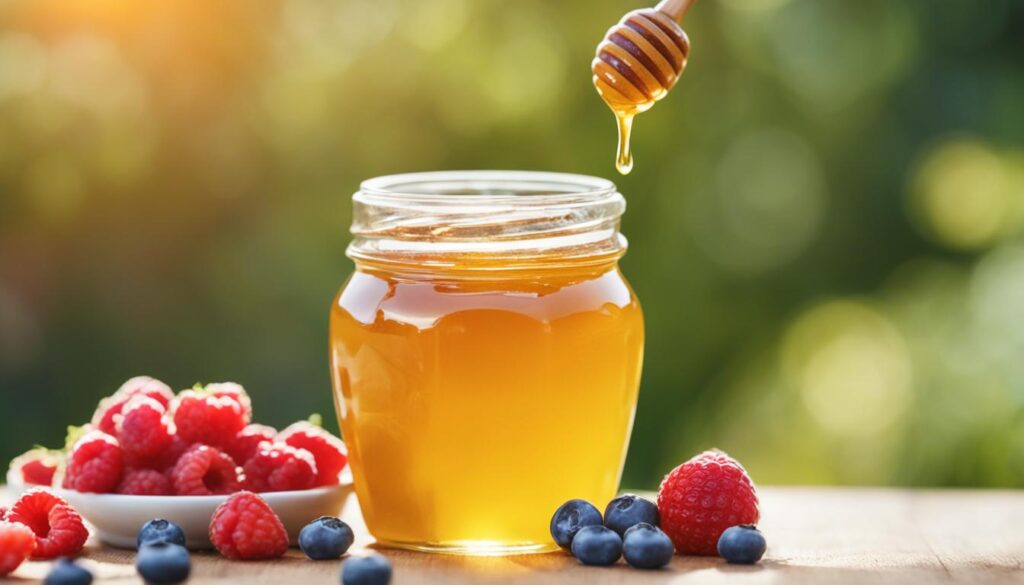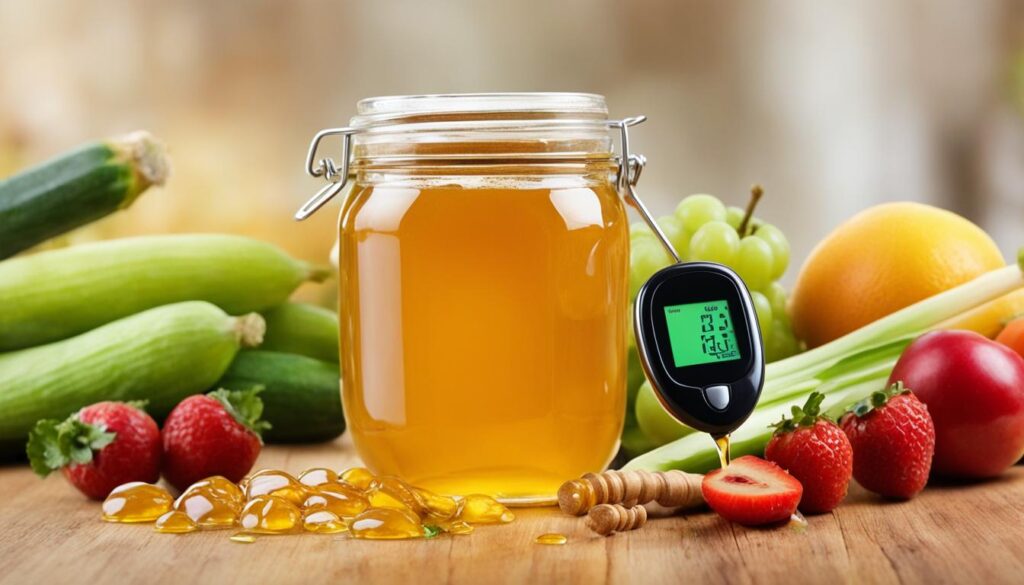When it comes to natural sweeteners with numerous health benefits, honey takes the crown. This golden elixir, derived from bees and flower nectar, has been used for centuries for its medicinal properties and delicious taste. Packed with bee pollen, enzymes, propolis, and vitamins, honey is more than just a sweet treat.
Honey offers a range of health benefits, making it a versatile addition to your diet and wellness routine. From promoting radiant skin and lustrous hair to aiding in weight loss and boosting the immune system, honey’s natural goodness knows no bounds. Let’s explore the incredible ways honey can enhance your well-being.
Key Takeaways
- Honey is a natural sweetener with a rich history of medicinal use.
- Raw honey is a powerhouse of antioxidants and helps control blood sugar levels.
- Honey has heart disease prevention properties and aids in wound healing.
- It is effective in relieving coughs and is traditionally used during Rosh Hashanah.
- Caution should be taken when giving honey to infants due to the risk of botulism.
The Unique Health Benefits of Honey

Honey is more than just a delicious natural sweetener. It offers a wide range of unique health benefits that make it a valuable addition to your diet. From its rich antioxidant content to its ability to control blood sugar levels, honey has been used for centuries for its medicinal properties.
Antioxidant Powerhouse
One of the key health benefits of honey is its high antioxidant content. Antioxidants are compounds that help protect your body against free radicals, which can damage cells and contribute to various diseases. The antioxidants in honey include phenols, flavonoids, and organic acids, which have been shown to have powerful health-promoting effects.
Controlled Blood Sugar Levels
Contrary to popular belief, honey can actually help regulate blood sugar levels. Although it is a natural sweetener, the unique combination of sugars in honey, including fructose and glucose, is metabolized differently by the body compared to refined sugar. This slower release of sugars into the bloodstream helps prevent spikes in blood sugar levels.
Heart-Healthy Properties
Studies have shown that honey may have heart-protective effects. Regular consumption of honey has been associated with reduced risk factors for heart disease, such as lower blood pressure and improved cholesterol levels. The antioxidants in honey also contribute to its cardiovascular benefits by reducing oxidative stress and inflammation in the arteries.
Natural Wound Healer
Honey has been used for centuries as a natural remedy for wounds and infections. Its antimicrobial properties help prevent infection and promote healing. Honey creates a protective barrier over the wound, keeping it moist and preventing bacterial growth. It also stimulates the growth of new tissue and reduces inflammation, leading to faster healing.
“Honey has long been recognized for its wound-healing properties. It has been used in traditional medicine for centuries and is now being increasingly used in modern healthcare settings.” – Dr. Amanda Johnson, Medical Researcher
Cough Relief and Sore Throat Soother
If you’re looking for a natural remedy to relieve coughing and soothe a sore throat, look no further than honey. Its thick consistency helps coat the throat, providing temporary relief. Honey also has antibacterial properties that can help with respiratory infections. In fact, several studies have shown that honey is just as effective, if not more effective, than over-the-counter cough suppressants.
Immune-Boosting and Digestive Aid
Honey is known for its immune-boosting properties thanks to its antioxidant content. Antioxidants help strengthen the immune system and protect against harmful pathogens. Additionally, honey has been shown to improve digestion by soothing the digestive tract and promoting the growth of beneficial gut bacteria.
Whether you add it to your morning tea, drizzle it on your yogurt, or use it as a natural remedy, honey is a versatile and valuable ingredient that offers a myriad of health benefits.
The Antioxidant Power of Honey

Honey is a remarkable natural product that not only satisfies our taste buds but also provides a range of health benefits. One of the key reasons behind these benefits is the antioxidant power of honey.
Antioxidants play a crucial role in our body by neutralizing harmful free radicals. Free radicals are unstable molecules that can cause damage to cells and contribute to various chronic diseases including cancer, diabetes, heart disease, and Alzheimer’s. By combating free radicals, antioxidants help protect our body from these health issues.
Honey is rich in polyphenols and flavonoids, which are potent antioxidants. These compounds are derived from the nectar sources that bees visit, resulting in variations in the types and levels of antioxidants present in different honey varieties. Generally, darker honey varieties tend to have higher levels of these protective plant compounds.
Research has shown that the antioxidants present in honey can have significant health benefits. They help reduce inflammation, enhance immune function, and promote overall well-being. Additionally, the antioxidant properties of honey may contribute to its potential cancer-fighting properties.
The Antioxidant Power of Honey: A Comparative Analysis
| Honey Variety | Antioxidant Level |
|---|---|
| Acacia Honey | High |
| Manuka Honey | Very High |
| Buckwheat Honey | High |
As shown in the table above, different honey varieties possess varying levels of antioxidants. Manuka honey, for example, is renowned for its exceptionally high antioxidant content, making it a popular choice among health-conscious individuals. Acacia honey and buckwheat honey are also known to contain high levels of antioxidants, offering similar health benefits.
“The antioxidants in honey help protect our body from free radicals and reduce the risk of chronic diseases.” – Dr. Sarah Thompson, Honey Research Institute
Incorporating antioxidant-rich honey into your diet can be a simple and delicious way to boost your overall health. Whether you drizzle it over yogurt, use it in salad dressings, or enjoy it in a cup of herbal tea, honey can be a versatile and flavorful addition to your daily routine.
In the next section, we will delve into how honey can aid in blood sugar control and its role as a natural sweetener.
Honey and Blood Sugar Control

When it comes to sweeteners, honey stands out as a natural alternative to plain white sugar. If you’re conscious about your blood sugar levels, incorporating pure, raw honey into your diet may offer some benefits. Unlike refined sugar, honey has a gentler impact on blood sugar levels, making it a favorable option for those looking to manage their glucose levels.
In addition to its low glycemic index, honey has been found to enhance insulin sensitivity, which is crucial for the body’s proper utilization of glucose. This means that consuming honey may help your cells respond more effectively to insulin, resulting in better blood sugar control.
One important hormone that honey may influence is adiponectin. Adiponectin plays a significant role in regulating blood sugar levels, as well as lipid metabolism and inflammation. Research suggests that honey consumption may increase adiponectin levels in the body, providing further support for its potential benefits in blood sugar management.
It’s essential to note that while moderate honey consumption may improve markers of diabetes risk, individuals who are already managing diabetes should still exercise caution and consult with their healthcare provider to determine the appropriate amount of honey to incorporate into their overall diet plan.
| Honey | White Sugar |
|---|---|
| Raw honey has a lower glycemic index compared to white sugar. | White sugar has a high glycemic index, leading to rapid spikes in blood sugar levels. |
| Honey enhances insulin sensitivity, aiding in the body’s utilization of glucose. | White sugar contributes to insulin resistance, which impairs glucose utilization. |
| Honey may increase adiponectin levels, a hormone that helps regulate blood sugar. | White sugar has no effect on adiponectin levels. |
By choosing honey as a natural sweetener, you can enjoy a delicious alternative while potentially supporting better blood sugar control. However, it’s important to remember that moderation is key. Incorporate honey as part of a balanced diet to reap its benefits without compromising your overall health.
Honey for Heart Health

Honey, with its natural sweetness, offers more than just a delicious taste. It may also contribute to heart health by providing relief from certain risk factors associated with heart disease and stroke.
One of the noteworthy benefits of honey is its ability to lower blood pressure. Studies have shown that consuming honey regularly can help reduce both systolic and diastolic blood pressure levels, which are important markers for cardiovascular health.
In addition to blood pressure control, honey has shown promise in improving cholesterol levels. Research indicates that honey can help increase levels of high-density lipoprotein (HDL) cholesterol, also known as the “good” cholesterol, while decreasing levels of low-density lipoprotein (LDL) cholesterol, often referred to as the “bad” cholesterol. Maintaining a healthy balance of these cholesterol types is crucial for heart health.
Honey’s heart-protective properties extend beyond blood pressure and cholesterol management. The antioxidants present in honey help protect arteries from oxidative damage. Oxidative stress can contribute to the development of atherosclerosis, a condition characterized by the buildup of plaque in the arteries, leading to reduced blood flow and an increased risk of heart disease.
An interesting feature of honey is its anti-inflammatory enzymes, which help promote arterial health. Chronic inflammation plays a significant role in the development of heart disease, and reducing inflammation can have a positive impact on overall cardiovascular health.
Overall, incorporating honey into a balanced diet may prove beneficial for heart health. Its ability to lower blood pressure, improve cholesterol levels, protect arteries from oxidative damage, and combat inflammation all contribute to its potential role in heart disease prevention.
| Benefits of Honey for Heart Health: | How It Helps: |
|---|---|
| Lowering blood pressure | Honey has been shown to reduce both systolic and diastolic blood pressure levels. |
| Improving cholesterol levels | Honey increases levels of HDL cholesterol and decreases levels of LDL cholesterol. |
| Protecting arteries from oxidative damage | The antioxidants in honey help prevent the oxidative stress that can lead to atherosclerosis. |
| Promoting arterial health | Honey’s anti-inflammatory enzymes support overall cardiovascular health. |
With its many benefits for heart health, honey is a natural and delicious addition to your diet. Remember to choose raw, unprocessed honey for maximum nutritional value. However, it’s essential to note that honey should be consumed in moderation as part of an overall healthy lifestyle.
Honey’s Healing Properties

When it comes to natural remedies for wound healing and infection control, honey shines as a superstar. With its remarkable properties, honey has long been used as a go-to treatment for burns, wounds, and skin infections.
One of the key reasons why honey is so effective in promoting healing is its antimicrobial effects. Honey contains hydrogen peroxide, which helps combat bacteria and prevent infection. Additionally, honey’s high sugar content creates an osmotic effect that draws out moisture from wounds, preventing the growth of bacteria and reducing inflammation.
But the benefits of honey don’t stop there. This golden elixir creates an ideal environment for new tissue growth, expediting the healing process and reducing scarring. It also contains antioxidants that help protect the skin from free radicals, promoting a healthy and youthful complexion.
Due to its nourishing properties, honey has been used in skincare and haircare products for centuries. Its moisturizing and soothing abilities make it a popular ingredient in face masks, creams, and shampoos. When applied to the skin, honey can hydrate, soften, and repair damaged skin cells. It can also calm inflammation and provide relief for skin conditions such as acne and eczema.
For those seeking luscious locks, honey can work wonders for your hair. It can help retain moisture, prevent breakage, and promote healthy hair growth. Incorporating honey into your haircare routine can leave your strands shiny, silky, and vibrant.
“Honey’s healing properties make it a natural choice for treating wounds, burns, and skin infections. Its antimicrobial effects, along with its ability to reduce inflammation and promote tissue growth, make it an effective remedy for various skin concerns.”
Whether you’re dealing with a minor cut, a stubborn skin condition, or simply want to enhance your beauty routine, honey can provide the healing and nourishing properties you’re looking for.
The Healing Power of Honey:
- Promotes wound healing and prevents infections
- Reduces inflammation and minimizes scarring
- Moisturizes and nourishes the skin
- Calms skin conditions such as acne and eczema
- Retains moisture and promotes healthy hair growth
Honey for Cough Relief

Honey surpasses common over-the-counter cough remedies in relieving coughs, especially in children. It coats and soothes irritated throats, thins mucus, and suppresses coughing episodes.
Honey for allergies: Honey’s natural properties make it an effective remedy for managing allergies. Regular consumption of locally sourced honey can help alleviate symptoms such as sneezing, runny nose, and itchy eyes.
| Benefits of Honey for Cough Relief: |
|---|
| Coats and soothes irritated throats |
| Thins mucus |
| Suppresses coughing episodes |
| Provides relief for allergies |
Note: Honey should not be given to infants under the age of one due to the risk of infant botulism. For older children, a teaspoon of honey at bedtime can effectively alleviate coughing and improve sleep quality.
Honey’s Traditional Role in Rosh Hashanah

In the celebration of Rosh Hashanah, the Jewish New Year, honey holds a significant place. It embodies the essence of sweetness and symbolizes the hope for a delightful year ahead. During this auspicious occasion, families come together to partake in a beloved tradition – dipping challah bread and apple slices into honey.
This act of dipping signifies the shared desire for joy, prosperity, and sweetness in the coming year. It is a beautiful and heartfelt expression of hope, as each bite infused with honey serves as a sweet reminder of the optimism surrounding the Rosh Hashanah festivities.
Rosh Hashanah Honey Tradition
| Element | Symbolism |
|---|---|
| Challah Bread | Wishing for an abundant year of sustenance |
| Apple Slices | Hope for a healthy and fruitful year |
| Honey | Desire for joy, prosperity, and sweetness |
Exploring Specialty Honey Varieties
Specialty honey varieties offer unique health benefits. These delicious options not only provide the natural sweetness of regular honey but also come with additional nutritional advantages. Let’s take a closer look at some remarkable specialty honey varieties:
Ginger Honey
Ginger honey is a delightful blend of ginger extract and honey. It not only adds a hint of spicy flavor to your dishes but also offers anti-inflammatory and antioxidant properties. The combination of ginger’s medicinal properties and honey’s health benefits makes this variety a standout choice.
Cinnamon Honey
Cinnamon honey is a heavenly fusion of cinnamon and honey, providing a delightful aroma and taste. This variety not only enhances the flavor of your meals and beverages but also helps in maintaining healthy blood sugar levels. It also offers protection against heart disease and bacteria, making it an ideal choice for those seeking additional health benefits.
Turmeric Honey
Turmeric honey is a powerhouse combination of turmeric’s remarkable anti-inflammatory effects and the natural sweetness of honey. This variety provides benefits that are particularly beneficial for managing conditions like arthritis, heart disease, and Alzheimer’s disease. Make this golden honey a part of your daily routine for enhanced well-being.
Bee-Derived Honey Varieties
In addition to these flavor-infused options, there are also specialty honey varieties that contain bee-derived components such as pollen, royal jelly, and propolis. These varieties provide extra health benefits thanks to their antimicrobial, antioxidant, vitamin, and protein content. Including these bee-enhanced honey varieties in your diet can offer a range of unique advantages.
The Benefits of Raw Honey
Raw honey, also known as unpasteurized honey, offers a multitude of health benefits. This natural sweetener is not only delicious but also packed with essential nutrients and beneficial compounds.
One of the key advantages of raw honey is its antioxidant properties. Raw honey contains a variety of plant chemicals that act as antioxidants, helping to protect the body against oxidative stress and potentially reducing the risk of various health conditions.
Raw honey is also a rich source of micronutrients, amino acids, and enzymes. These nutrients provide nourishment and support various bodily functions, helping to maintain overall health and well-being.
In addition to its nutritional value, raw honey possesses antibacterial and antifungal properties. It has been traditionally used in wound healing due to its ability to fight off harmful bacteria and promote skin regeneration.
The phytonutrients present in raw honey contribute to its immune-boosting benefits. Regular consumption of raw honey may strengthen the immune system and help the body defend against infections and diseases.
Research suggests that raw honey may also have anticancer properties. Some studies have shown that certain components in raw honey can inhibit the growth and spread of cancer cells, making it a potentially promising adjunct therapy in cancer treatment.
It’s important to note that while raw honey offers a range of health benefits, it should be consumed in moderation as part of a balanced diet. Excessive consumption of any sweetener, including honey, can contribute to weight gain and other health issues.
Table: Benefits of Raw Honey
| Benefit | Description |
|---|---|
| Antioxidant Properties | Raw honey contains plant chemicals that act as antioxidants, protecting against oxidative stress. |
| Essential Nutrients | Raw honey provides micronutrients, amino acids, and enzymes for overall health support. |
| Antibacterial and Antifungal | Raw honey has natural properties that fight off bacteria and fungi, making it useful in wound healing. |
| Immune-Boosting | Regular consumption of raw honey may help strengthen the immune system and defend against infections. |
| Anticancer Potential | Some components in raw honey have shown potential in inhibiting the growth and spread of cancer cells. |
It’s always best to choose raw honey from reputable sources and store it properly to maintain its freshness and quality. Raw honey can crystallize over time, but this can be easily reversed by gently warming it. However, be cautious when feeding raw honey to infants or anyone with honey or bee pollen allergies.
Raw honey is a versatile and nutritious addition to your diet. Whether enjoyed on toast, added to tea, or used as a natural sweetener in recipes, raw honey can provide both flavor and health benefits.
Choosing and Storing Raw Honey
When it comes to enjoying the many benefits of honey, opting for raw honey is key. Look for labels that specifically indicate “raw” to ensure you’re getting the best quality. Purchasing from trusted local producers or reputable sources is also important.
To maintain the freshness and potency of raw honey, it’s crucial to store it properly. Keep your raw honey in a tightly sealed container to prevent exposure to air and moisture. Store it away from direct sunlight and extreme temperatures, as these can degrade its quality.
It’s normal for raw honey to crystallize over time. If you find your honey has become solid, simply warm it slightly to melt the crystals. Avoid using high heat as it may diminish some of the beneficial properties.
While raw honey offers a myriad of health benefits, it’s important to be cautious if you have certain allergies or are caring for infants. Raw honey should be avoided in infants under one year old due to the risk of botulism. If you have honey or bee pollen allergies, exercise caution and consult with a healthcare professional before consuming raw honey.
FAQ
What are the health benefits of honey?
Honey offers a range of health benefits, including antioxidant-rich properties, blood sugar control, heart disease prevention, wound healing, cough relief, improved digestion, allergy management, and cognitive benefits. It is also a natural sweetener.
How does honey help control blood sugar?
Compared to plain white sugar, raw honey has a gentler impact on blood sugar levels. It enhances insulin sensitivity and may increase adiponectin, a hormone that regulates blood sugar.
Can honey prevent heart diseases?
Yes, honey can help lower blood pressure, improve cholesterol levels, and protect arteries from oxidative damage. It contains anti-inflammatory enzymes that promote arterial health.
How does honey aid in wound healing?
Honey has remarkable properties for wound healing and infection control. Its antimicrobial effects make it effective for treating burns, wounds, and skin infections. Honey combats bacteria, reduces inflammation, and creates an ideal environment for new tissue growth.
Does honey relieve coughing?
Yes, honey surpasses common cough remedies in relieving coughs, especially in children. It coats and soothes irritated throats, thins mucus, and suppresses coughing episodes.
What is the traditional role of honey in Rosh Hashanah?
Honey plays a central role in Rosh Hashanah, the Jewish New Year. It is used as a symbol of sweetness and a wish for a sweet new year by dipping challah bread and apple slices into honey.
Are there different types of honey with unique health benefits?
Yes, specialty honey varieties such as ginger honey, cinnamon honey, and turmeric honey offer additional health benefits. Bee-derived honey varieties containing pollen, royal jelly, and propolis provide antimicrobial, antioxidant, vitamin, and protein content.
What are the benefits of raw honey?
Raw honey contains antioxidants, essential micronutrients, amino acids, and enzymes. It has antibacterial and antifungal properties and has been used in wound healing. Raw honey’s phytonutrients contribute to immune-boosting, anticancer, and cognitive benefits.
How do I choose and store raw honey?
When opting for raw honey, look for labels specifically indicating “raw” and purchase from trusted local producers or reputable sources. Store raw honey in a tightly sealed container away from light and extreme temperatures. Discard honey that has drastically changed color or smells off.






